Like it or Not – Workplaces Will be Hybrid Forever
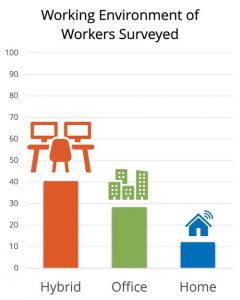
To call the COVID-19 pandemic “disruptive” would be an understatement. With most face-to-face interactions put on hold for the better part of two years, the way we socialized, entertained ourselves, and learned was fundamentally transformed. Nowhere else was this transformation more profound than in the world of work, as it became necessary for organizations to adopt fully virtual systems and processes overnight. Though the immediate public health threat posed by COVID-19 has receded somewhat, there appears to be no question of a return to the status quo ante, at least not for the near future. Research indicates that as of February 2023, 40.4% of workers surveyed were still operating in some kind of hybrid arrangement, with 28.3% spending at least some time in the office and 12.1% working entirely from home.(1) With such a considerable share of the workforce still working remotely in some capacity, it is worth surveying the state of hybrid work in 2023 from the perspective of employee retention, workplace productivity, and business performance.
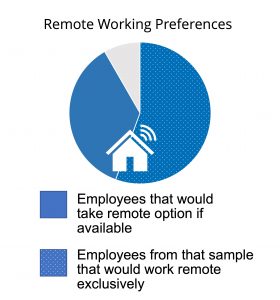
With COVID-19 top-of-mind for most of the last three years, at this point it is likely that almost all of us have experienced serious bouts of pandemic exhaustion. Interestingly however, there does not appear to be any kind of corresponding fatigue with remote work, even as other aspects of our lives began to return to pre-pandemic normalcy. Indeed, if anything, remote work has gained popularity since March 2020. Recently, McKinsey conducted a survey of 25,000 American workers which revealed that 87% of employees would take at least partial advantage of remote opportunities if they were made available, while 65% of that sample indicated that they would be willing to work exclusively from home if given the chance. This enthusiasm for hybrid working arrangements is also reflected in the priorities of current job-seekers – the McKinsey study revealed that among those looking for a new job or planning to look for a new job, flexible location and hours were top incentivizing factors (behind only pay and career opportunities).(2)
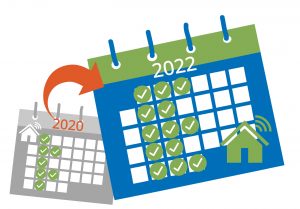
Top talent especially is beginning to expect complete flexibility in working arrangements from prospective employers, something reflected in the latest corporate work-from-home policies; research indicates that “In June 2020, most companies expected employees to be working from home around one and a half days a week, but the subsequent two years have seen the expectation of home-working go up each successive month—most firms now expect workers to be at home for almost half of the week”.(3) Overall, there appears to be widespread consensus among workers today in favour of more flexible working arrangements – organizations looking to maintain strong employee retention would be wise to pay close attention to this sentiment.
How is Hybrid work impacting workplace productivity and business performance?
 But how has this move towards remote and hybrid work impacted workplace productivity and business performance? In some ways, it depends on who is being asked. Workers generally self-report higher levels of efficiency completing day-to-day tasks at home, while managers by contrast usually indicate that remote work has had a negative effect on productivity. Only 17.8% of managers surveyed in a recent work-from-home research initiative suggested that remote working was a positive factor for workplace effectiveness. On the opposite end of the spectrum, only 15.3% of workers sampled in that same survey favoured working on-site, believing that they were capable of working just as efficiently from home.(4) The evidence in fact generally appears to support this claim, with 94% of HR leaders in a COVID-era study indicating that employees were at least as productive remotely as they had been in the office (if not more).(5) Similarly, according to research conducted by a performance monitoring firm, data points collected from 30,000 workers indicated a 5% increase in productivity working remotely.(6)
But how has this move towards remote and hybrid work impacted workplace productivity and business performance? In some ways, it depends on who is being asked. Workers generally self-report higher levels of efficiency completing day-to-day tasks at home, while managers by contrast usually indicate that remote work has had a negative effect on productivity. Only 17.8% of managers surveyed in a recent work-from-home research initiative suggested that remote working was a positive factor for workplace effectiveness. On the opposite end of the spectrum, only 15.3% of workers sampled in that same survey favoured working on-site, believing that they were capable of working just as efficiently from home.(4) The evidence in fact generally appears to support this claim, with 94% of HR leaders in a COVID-era study indicating that employees were at least as productive remotely as they had been in the office (if not more).(5) Similarly, according to research conducted by a performance monitoring firm, data points collected from 30,000 workers indicated a 5% increase in productivity working remotely.(6)
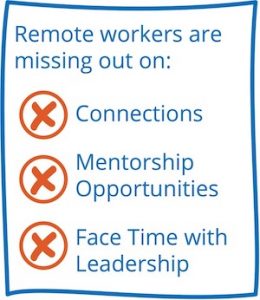 The above concerns about poor productivity in remote settings from some managers, reflecting a lack of visibility into the activities of their employees during working hours, could be resolved by an introduction of some face-to-face work should employees approve. Indeed, some trends are beginning to emerge which might force at least a partial return to the office. Amidst some economic instability in certain sectors, studies find that remote workers tend to report a higher degree of concern for their job security than those working in-person. In turn, these anxieties were also found to have had an impact on productivity. Some organizations may find it necessary to expand in-person work opportunities so that employees do not “…lose out on an important social buffer against workplace stress”.(7) In any case, despite the continued popularity of remote work, organizations may not in fact be hard-pressed finding certain workers who are interested in returning to the office on at least a semi-permanent basis. Younger employees especially, who have little to no experience of the pre-pandemic workplace, are beginning to consider the missed connections, mentorship opportunities, and facetime with leadership afforded by in-person work, pointing to an additional incentive which may guide organizations back to the office in 2023 or encourage them to implement creative solutions to building connection such as Virtual Workplace Mentorship Programs.
The above concerns about poor productivity in remote settings from some managers, reflecting a lack of visibility into the activities of their employees during working hours, could be resolved by an introduction of some face-to-face work should employees approve. Indeed, some trends are beginning to emerge which might force at least a partial return to the office. Amidst some economic instability in certain sectors, studies find that remote workers tend to report a higher degree of concern for their job security than those working in-person. In turn, these anxieties were also found to have had an impact on productivity. Some organizations may find it necessary to expand in-person work opportunities so that employees do not “…lose out on an important social buffer against workplace stress”.(7) In any case, despite the continued popularity of remote work, organizations may not in fact be hard-pressed finding certain workers who are interested in returning to the office on at least a semi-permanent basis. Younger employees especially, who have little to no experience of the pre-pandemic workplace, are beginning to consider the missed connections, mentorship opportunities, and facetime with leadership afforded by in-person work, pointing to an additional incentive which may guide organizations back to the office in 2023 or encourage them to implement creative solutions to building connection such as Virtual Workplace Mentorship Programs.
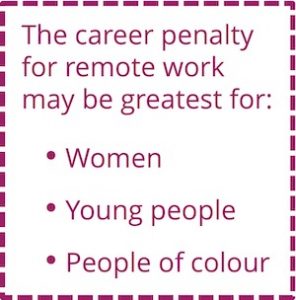 A full return to in-person work at this stage seems unlikely. The figures above indicate that a strong majority of workers prefer flexible work arrangements and some autonomy. Ultimately, it appears that the work-life balance and productivity benefits perceived by many employees in hybrid work outweigh the professional considerations related to in-person work. As per a recent New York Times article, “The career penalty for remote work may be greatest for women, young people and people of colour, who often lack the professional networks that being in the office can help provide. But numerous surveys find that those same groups of workers are also the ones who value flexible arrangements the most, and who are the least likely to return to the office voluntarily”.(8) Clearly, some benefits to in-office work exist, but organizations must take the huge popularity of hybrid arrangements into account; bringing employees back into the office for purposeful, targeted face-to-face interaction while maintaining working location flexibility and integrating innovative ways to create connection in a hybrid workforce appears to be the direction in which many sectors are headed. Overall, hybrid configurations will likely continue to be the norm in workplaces big and small for the foreseeable future.
A full return to in-person work at this stage seems unlikely. The figures above indicate that a strong majority of workers prefer flexible work arrangements and some autonomy. Ultimately, it appears that the work-life balance and productivity benefits perceived by many employees in hybrid work outweigh the professional considerations related to in-person work. As per a recent New York Times article, “The career penalty for remote work may be greatest for women, young people and people of colour, who often lack the professional networks that being in the office can help provide. But numerous surveys find that those same groups of workers are also the ones who value flexible arrangements the most, and who are the least likely to return to the office voluntarily”.(8) Clearly, some benefits to in-office work exist, but organizations must take the huge popularity of hybrid arrangements into account; bringing employees back into the office for purposeful, targeted face-to-face interaction while maintaining working location flexibility and integrating innovative ways to create connection in a hybrid workforce appears to be the direction in which many sectors are headed. Overall, hybrid configurations will likely continue to be the norm in workplaces big and small for the foreseeable future.
 Jacob Harvey, Research Assistant, Pollinate Networks Inc.
Jacob Harvey, Research Assistant, Pollinate Networks Inc.
Jacob Harvey, a recent graduate of the University of Toronto, is a research assistant at Pollinate Networks Inc. Jacob gathers, synthesizes, and analyzes the latest research and literature in relevant areas such as mentoring and business development. Jacob also works as a project coordinator with the Operations Team at Pollinate.
References:
- Jose Maria Barrero et al, “Survey of Workplace Arrangements and Attitudes – April 2023 Updates,” April 5, 2023, 7.
- “Americans are embracing flexible work—and they want more of it,” McKinsey & Company, June 23, 2022.
- Bruce Daisley, “The Work-From-Anywhere War Is Beginning,” Wired, December 29, 2022.
- Matthew Boyle, “Work Shift: The New Productivity Paradox,” Bloomberg, November 29, 2022.
- Gleb Tsipursky, “The return to the office once seemed inevitable. A new study shows companies are already reversing course,” Fortune, March 9, 2023.
- Bryan Robsinon, “3 New Studies End Debate Over Effectiveness Of Hybrid And Remote Work,” Forbes, February 4, 2022.
- Liz Fosslien, Sara Gottlieb-Cohen, “Research: Remote Workers Are More Anxious About Layoffs,” Harvard Business Review, March 22, 2023.
- Emma Goldberg, Ben Casselman, “What Young Workers Miss Without the ‘Power of Proximity’” New York Times, April 24, 2023.

 Jacob Harvey, Research Assistant, Pollinate Networks Inc.
Jacob Harvey, Research Assistant, Pollinate Networks Inc.


